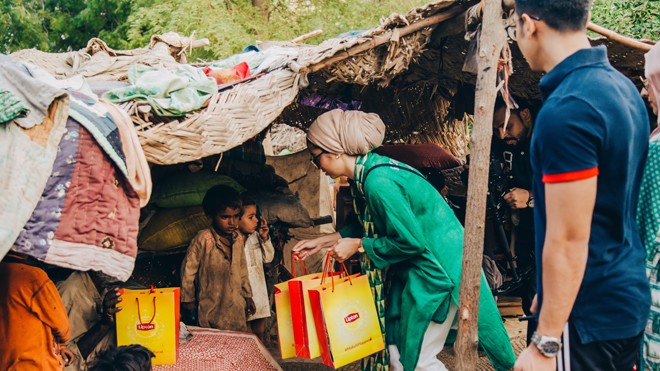
What being part of the ‘Feeding Smiles: Food Redistribution Campaign’ entailed

We stood under the merciless rays of the sun, streams of sweat flowing down our faces; our eyes made itchy by the dust in the air. An army of children stood before me, restless and manic. It was the 30 of us against nearly 700 of them. Creating order through the chaos was truly an exigent task.
As part of the ‘Feeding Smiles: Food Redistribution Campaign,’ which is a collaboration of the now internationally famous Robin Hood Army (RHA), a volunteer-based organisation that collects surplus food from restaurants and gets it to the less fortunate, and Next Generation Pakistan (NGP), a youth-based charity working towards social development, we formed a systematic chain through which we handed out meals to the starving children. The children would hurry along to a side and begin devouring the food; understandable, given their hunger.
But the hours leading to this had been truly hectic: I, along with a few other volunteers, had to drive around Lahore, going from restaurant to restaurant, and collect the leftover food. After accumulating a myriad of food items, we went to a friend’s house in Johar Town and began to package the food. Once the food was divided into 700-odd packets, we loaded them in our cars and set off to our destination: Samsani Road.
The heat was ceaseless in its brutality and the hungry children never seemed to end. A young child, no more than nine years of age, calmly took a packet from me, murmured a word of "Meharbani" (thanks), and began to walk in the opposite direction. For some inexplicable reason, the glimmer of sincere gratitude in his hazel-green eyes was etched onto my mind.
As I began to contemplate what had happened, my body continued the robotic motion of handing out the food packets. It was perplexingly odd, and that warranted further investigation.
I asked the volunteer behind me to take over, while I began to look for that child. At last I caught sight of him. He was ambling towards the ground in front of us. I followed him through the maze of ripped tents until we reached what seemed to be his home. He finally turned around, saw me, and with that same tranquil face, gestured as if asking me to follow him inside.
It was a tenebrous place with a single mattress laid on the ground. A few inches away, a young girl was playing with two stones. She perked up instantly as she spotted her brother who placed the food packet before her, and the two began to eat from it frantically.
"Don’t eat the whole thing, leave some for Ama," the boy told her, in crude Punjabi. I was quite touched.
"Won’t you have some for yourself?" I asked him.
"I had breakfast. I’ll eat at night again. For now, I need to find some water for them."
"I have some water back at the distribution area. Come with me," I told him.
As we walked back, our conversation took off. This nine-year-old, named Aurangzeb, had a responsibility on his very young shoulders, something which even most adults in our society wouldn’t be able to bear. He had to provide for his family.
Aurangzeb was the eldest of the two children. His mother was ailing and bed-ridden. His father had passed away almost a year ago and now he was left to fend for himself and his family.
A preadolescent child, with his own stomach rumbling from hunger, wouldn’t fall short on his responsibilities as the bread earner and moved out to fetch water for his younger sister.
And, I thought back to when I was nine: playing the new ‘PlayStation’ with my brother, going to one of the most revered academic institutions in the country, and coming home to delectable meals. All the food thrown in the trash, all the water in the shower I had wasted, all the times I had left the lights on in my room, the air conditioners which made my home cooler but allowed carcinogenic radiation into the street outside -- they all came back with a haunting vengeance.
When I was nine, I took things for granted, those things which Aurangzeb had never even seen. He grabbed my hand, as tears shed from his eyes. His voice resonates in my mind even to this day, "Meharbani!"
I owe it to my experience with the RHA and NGP for making me realise the extent of privileges people like me enjoy but take for granted. I also realised the importance of charity, how we flick past the blue and green notes in our wallets only to find spare change to give to a random beggar out in the street. Many of us even have the audacity to criticise and abuse them.
It was not Aurangzeb’s fault that he had to endure the calamity that he did; forces beyond his control were responsible for that.